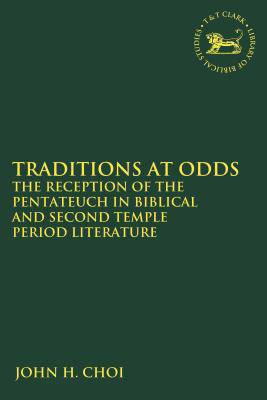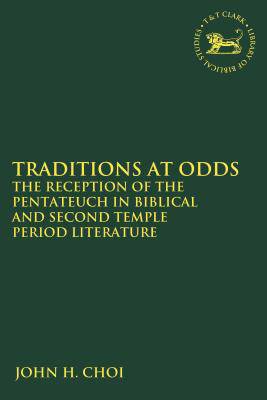
Bedankt voor het vertrouwen het afgelopen jaar! Om jou te bedanken bieden we GRATIS verzending (in België) aan op alles gedurende de hele maand januari.
- Afhalen na 1 uur in een winkel met voorraad
- In januari gratis thuislevering in België
- Ruim aanbod met 7 miljoen producten
Bedankt voor het vertrouwen het afgelopen jaar! Om jou te bedanken bieden we GRATIS verzending (in België) aan op alles gedurende de hele maand januari.
- Afhalen na 1 uur in een winkel met voorraad
- In januari gratis thuislevering in België
- Ruim aanbod met 7 miljoen producten
Zoeken
Traditions at Odds
The Reception of the Pentateuch in Biblical and Second Temple Period Literature
John H Choi
€ 79,95
+ 159 punten
Omschrijving
Traditions at Odds explores the Pentateuch's literary influence on other biblical texts. There exist a number of content discrepancies between pentateuchal and non-pentateuchal texts that treat the same subject. Through a detailed analysis, the author argues that the discrepancies are not alterations of pentateuchal material, as is generally argued, but rather indications of independent traditions. Thus, much of biblical literature was written outside of the Pentateuch's purview. Corroborating evidence is found in literature from the Second Temple Period, which also exhibits a lack of conformity to the Pentateuch. After demonstrating this independence, this study explores its implications on the composition of biblical texts and the process of canonization.
Â
Marked by an interdisciplinary approach, the study incorporates recent theoretical developments in literary and ideological criticism, as well as ritual, historiography and textual citation. It not only provides a broader base of study, but serves to address a deficiency in biblical studies: most studies of intertextuality operate with little theoretical grounding, while studies in ritual or historiography are based on models from the late 19th/early 20th centuries.
Â
Marked by an interdisciplinary approach, the study incorporates recent theoretical developments in literary and ideological criticism, as well as ritual, historiography and textual citation. It not only provides a broader base of study, but serves to address a deficiency in biblical studies: most studies of intertextuality operate with little theoretical grounding, while studies in ritual or historiography are based on models from the late 19th/early 20th centuries.
Specificaties
Betrokkenen
- Auteur(s):
- Uitgeverij:
Inhoud
- Aantal bladzijden:
- 288
- Taal:
- Engels
- Reeks:
Eigenschappen
- Productcode (EAN):
- 9780567687579
- Verschijningsdatum:
- 21/03/2019
- Uitvoering:
- Paperback
- Formaat:
- Trade paperback (VS)
- Afmetingen:
- 156 mm x 234 mm
- Gewicht:
- 408 g

Alleen bij Standaard Boekhandel
+ 159 punten op je klantenkaart van Standaard Boekhandel
Beoordelingen
We publiceren alleen reviews die voldoen aan de voorwaarden voor reviews. Bekijk onze voorwaarden voor reviews.









